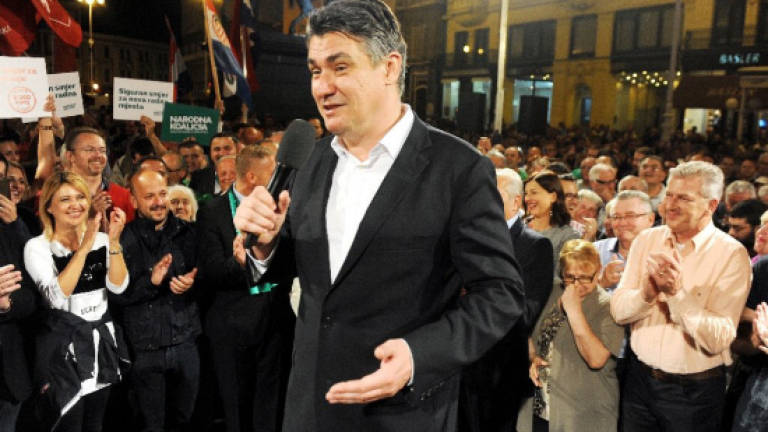Deadlocked Croatia holds uncertain snap election

ZAGREB: Croatians were voting Sunday in a snap election whose outcome might prolong political uncertainty in the EU's newest member, which had shifted to the right under the previous conservative government.
The election comes as the former Yugoslav republic faces economic struggles and at a time of strained ties between neighbours in the volatile Balkans, notably with former enemy Serbia.
At 0930 GMT (5.30pm Malaysia), four-and-a-half hours after polling stations opened, turnout was nearly 19%, the electoral commission said. It was some three percentage points less than at the same time in the November elections.
Some 3.8 million Croatians are eligible to cast ballots after a November election produced no absolute winner.
Polling stations close at 1700 GMT.
A barely-functioning coalition government, led by the conservative HDZ party, took power after that vote before collapsing in June over a conflict of interest scandal.
The coalition's five-month rule was marked by a shift to the right amid a growing climate of intolerance, including attacks on independent media and minorities, notably ethnic Serbs.
Authorities have appeared to turn a blind eye to the far-right surge, but it has sparked global concern and brought already frosty ties with Serbia to their lowest level since Croatia's 1990s independence war.
No absolute winner
Polls and analysts have given a slight lead to a coalition led by the main conservative Social Democrats (SDP) of former prime minister Zoran Milanovic, who was in power for four years until November.
"SDP seems set to win but without an absolute majority" in the 151-seat parliament, political analyst Zarko Puhovski told AFP.
The likeliest outcome is a similar scenario to that of the previous vote – prolonged talks on forming a government and potentially another election.
HDZ is banking on staying in power with a new and more moderate leader, Andrej Plenkovic, who has pledged to move it away from populism and extremism.
"I'm changing the HDZ... My mission is to position it in the centre-right," said the 46-year-old former member of the European Parliament.
HDZ's former junior government partner – the "Most" party (meaning "Bridge" in Croatian) – is likely to play kingmaker once again.
With Plenkovic's moderate agenda, HDZ could also count on the backing of minorities, notably Serbs, as well as Croatians living abroad, its traditional supporters.
Rival Milanovic, 49, has been stressing his experience as premier and has pledged a "government of progress and tolerance."
However, he has sharpened his populist rhetoric after disappointing voters with scant reforms while in power.
After voting in downtown Zagreb, Milanovic said he was expecting the results feeling the "most relaxed ever."
"We showed that we are more competent, have more courage" to lead a new government, he told reporters.
Economic struggles
But Marko Tomic, a 39-year-old administrator, said he backs HDZ due to its "conservative stance" adding that with Plenkovic "it has got the needed modern, European perspective."
SDP is a "traditional choice" for Maja Markovic, but the 66-year-old pensioner warned that "Croatia is dealing too much with the past."
"The economy should be our priority and how to keep young people here," she added.
Almost a year of political deadlock has blocked reforms badly needed in Croatia, which emerged from a six-year recession in 2015.
The economy, relying largely on tourism along the country's Adriatic coast, remains one of the European Union's weakest despite some recent positive indicators attributed to membership of the bloc.
The central bank has forecast growth of 2.3% this year.
Unemployment stands at more than 13%, public debt has reached 85% of GDP, while the investment climate remains poor. — AFP